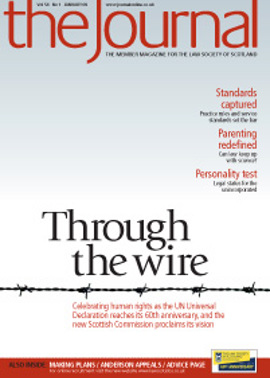Third parties and premature complaints
The Scottish Legal Complaints Commission (SLCC) can consider a service complaint from any party who appears to have been directly affected by inadequate professional services (s 2(2) of the Legal Profession and Legal Aid (Scotland) Act 2007).
Section 4 of the Act states that where complaints are received by the Commission, it shall not act on them until the solicitor or solicitors’ firm has been given a reasonable opportunity to deal with the complaint. The SLCC does not have discretion; if it receives a complaint which alleges professional misconduct, unsatisfactory professional conduct or inadequate professional service then the solicitor named in the complaint must be given the opportunity of resolving that complaint. This applies whether or not the complainer is a client of the firm.
This is a significant departure from current practice, in that the legislation creates a situation where solicitors must consider and act on complaints from parties to whom they are giving no service. The SLCC regards this step as an opportunity for self regulation and improvement.
The process that SLCC will use is as follows:
- The complainer is given notification that their complaint is premature and advised to make the complaint to the solicitor.
- The solicitor will be notified that a premature complaint has been made. The onus is on the complainer to raise the complaint directly.
When receiving such complaints, the SLCC expects solicitors to respond as follows:
- Investigate
Solicitors are expected to investigate the complaint. Investigations are expected to be thorough and meaningful.
- Reply
Solicitors are expected to respond to the complainer. The SLCC does appreciate that the letter to a non-client may be brief because of the solicitor’s duty of confidentiality to their own client.
- Record
Solicitors are expected to keep a record of any complaints received.
If the solicitor fails to deal with the complaint then it may lead to a further complaint which, if made to the SLCC, is within its jurisdiction to investigate. It may even refer the complaint to the Society as a conduct complaint.
The SLCC will notify only the solicitor named in the complaint that a premature complaint has been received, not the client relations partner of the firm. Firms should ensure that all staff know to bring such notices immediately to the client relations partner’s attention.
Consideration must be given to the method of responding to non-client complaints. This should be built into the firm’s complaints procedure and may imply training or retraining for certain members of staff.
In this issue
- Public law in Scotland
- Harmony in conflict management
- Tapping Reeve and his legacy
- Busy times at 60
- Living wills - why?
- Forward by the rights
- A cornerstone of rights
- Welcome for rejections takeup
- Sins of omission
- A time to buy?
- Parenthood reborn
- Persons unknown
- Front of the class
- Setting the standards
- Client service: the standards
- Judicial appointments: how you can take part
- ABS - the next phase
- Third parties and premature complaints
- Planning to perform
- Manual for the mind
- Computing on tap - or money down the drain?
- When resolution is not enough
- Ask Ash
- Making up lost time?
- Don't get caught short by transfer traps
- Collaboration: a new dimension
- Packed and ready
- Regulator on a roll
- Scottish Solicitors' Discipline Tribunal
- Website review
- Book reviews
- Medicines: the wrong cure
- Fraud alert! (and a cautionary tale)






